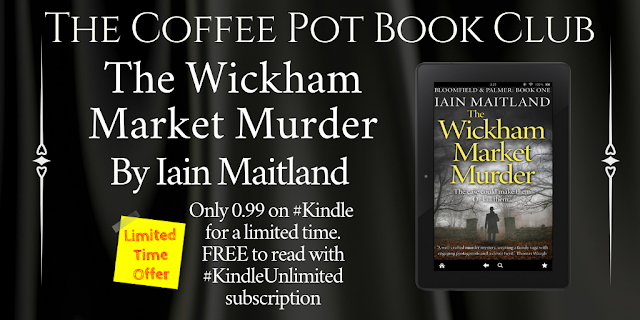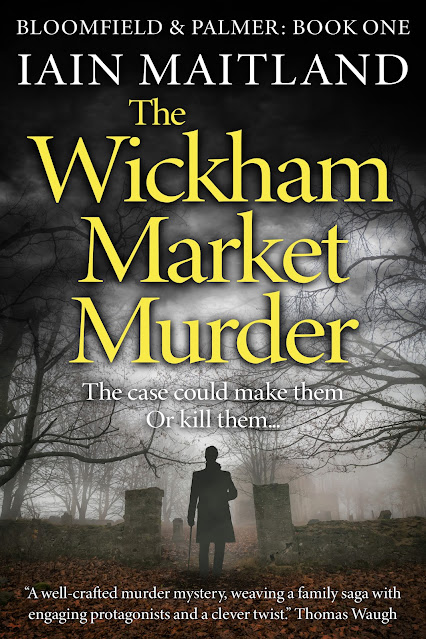(Bloomfield & Palmer Book 1)
By Iain Maitland
Publisher: Sharpe Books
Page Length: 140 Pages
Genre: Murder Mystery / Historical Fiction
Mary Anne: Congratulations on your recently published novel, The Wickham Market Murder (Bloomfield & Palmer Book 1). Could you tell us a little about your new book and what inspired you to set your murder mystery at the beginning of the 20th century?
Iain: It’s an Edwardian murder mystery novella, set in Suffolk in 1907, featuring two detectives, Bloomfield and Palmer. A housemaid is murdered during a great storm and Bloomfield and Palmer have to solve the crime before the killer strikes again. It’s Agatha Christie-ish.
I’ve always loved Edwardian era TV, books and films – early Upstairs, Downstairs and The Duchess Of Duke Street, as examples. I wanted to set a story in the early part of the 20th Century where I could write a whodunnit without having to think about DNA, CCTV cameras and mobile phones.
Mary Anne: When researching this era, did you come upon any unexpected surprises?
Iain: I’d expected the village of Wickham Market, north of Ipswich, to have been a quiet and isolated place. It wasn’t. Lots of shops, postal deliveries and busy, busy, busy! I imagined there might be one pub – there were seven. All in all, a thriving village.
Mary Anne: Why do you think this period in history is still really popular with readers?
Iain: I think for many people it still has an innocence and simplicity to it. That’s the perception of it anyway. I’m not sure I’d want to have lived in those times though. Life was hard. Men were off fighting wars – The Boer Wars. Many women faced a life of servitude. And the workhouse was always there, waiting …
Mary Anne: What do you think is the most challenging aspect of writing Historical Fiction during this era?
Iain: Trying to get both the broad brush and the minutiae of life right without getting too hung up about it. I wanted to write a rattling good yarn and show I’d done my research properly - reading books, looking at old photos, visiting and being shown round by a local historian - but without labouring that know-how .
Mary Anne: Does one of the main characters hold a special place in your heart? If so, why?
Iain: Well, they all do really in their own ways. William Palmer is the young local bobby who wants to solve a major crime and become a detective. He has the enthusiasms of youth. John Bloomfield is the battled-scarred, middle-aged detective from Ipswich who wants to follow ‘the 20th century policing methods from London’. He’s an older man, a little out of time.
My favourite is Alice Kemp, William’s sweetheart, the local school teacher and, according to William, ‘the very model of a modern woman’. In 1907, the country stands on the brink of so many changes; the suffragette movement, a World War etc. I’m looking forward to seeing how Alice develops in the next two novellas, The Southwold Murders and The Cobbold Point Murder, and what happens to her after that.
Anyone out and about in the village of Wickham Market in Suffolk on the night of 17 November 1907 would have to have had a good reason.
For it was the night of what was known locally, at least until the body was discovered the next morning, as ‘The Night of The Great Storm’. Lightning. Thunder. Torrential rain. On and on.
Whoever it was hiding amongst the trees and bushes close to the local vicarage had a good reason to be out and about. A compelling reason to be there. To commit murder.
The murderer – the murderer-to-be as they had never killed anyone before – had it all worked out in their head. They knew who they were going to murder. This was not going to be a random killing of some pretty young woman who caught their eye. Nor the first of a series of murders like Jack The Ripper’s some twenty years before. Not unless, of course, they were somehow uncovered and had to kill again to silence a witness; or witnesses.
They knew why they were killing their victim - their victim-to-be. They had thought about it before and for a while on and off. Wishing their victim dead. Hoping somehow that fate – perhaps even God – would intervene and some tragedy would befall them; falling down the stairs and breaking their neck with a sharp cra-ack. Not dying immediately but laying there in pain and knowing that death would be a blessed relief when it eventually came.
But nothing like that had happened and so they planned the murder. Knowing that a murder is never easy to commit. And that the plotting of it is hard. The when and the where and the how – all the doings of it – almost impossible to predict with certainty. Unless the murderer knows the victim’s routine, where they might be at a certain time, when they might be alone. How the murder can be committed. The victim certainly dead. And the murderer getting away and escaping justice forever.
And yet this, tonight, was a spur of the moment decision – to murder now. Something close to it anyway. A perfect set of circumstances coming together by chance.
To be carried out under cover of darkness. With nobody here in the Great Storm. Other than the murderer and the victim.
The murderer knew exactly what they were going to do – and how they were going to commit the murder.
They just had to crouch here a while, amongst the trees and bushes in woodland by the path to the vicarage, sheltering from the endless rain, with water running through their hair and trickling down their neck and inside of their clothes. The rain was so loud, so deafening, that they could not hear anything else, a poacher or a game-keeper out there in the nearby woods. Nor what they were waiting to hear – footsteps on the path, a sneeze or a cough.
And so they waited in the blackness, the vicarage lit up by a flash of lightning. A forbidding presence from a ghost story by M.R. James. And, less than a minute later, a deep rumble of thunder from afar. And again, another flash of lightning and another rumbling of thunder. This time, less than a minute between them. The storm was getting closer and reaching its peak.
They turned suddenly, spooked by a noise, a movement, something just behind them out of the corner of their eye. Expecting to see the game-keeper there, his gun pointing towards them. “What the hell are you doing here?” But there was no-one and nothing there. And they turned back and looked at what they had on the ground in front of them by their feet. A carving knife. A roll of twine. A heavy cloth.
Taken by surprise, their victim would turn, the cloth pushed into their mouth and down their throat so they could not make a noise.
The roll of twine wrapped around their neck, pulled tighter and tighter, until they fell dead at the murderer’s feet.
The knife, there if needed, to stab the victim, to cut their throat; whatever had to be done to kill them.
Another flash of lightning. The murderer – there was now no going back – looked up to see a blurred figure through the rain. A young housemaid running towards the vicarage. Her coat, something anyway, held high above her head to protect herself, as best she could, from the relentless rain. She stumbled as she got to the house, startled by the thunder now so close, and fell to the ground.
And the murderer, seizing their opportunity, was up on their feet, just grabbing the knife in their haste, glancing this way and that to make sure no-one was there to see them. And they were out of the trees and running across towards the path. But the housemaid, unknowing, was back on her feet too and moving towards the steps leading to the basement quarters. She was down the steps and into the vicarage before the murderer could catch up with her.
The murderer looked all around and then walked slowly down the steps. Stared through the window into the basement – the hallway to one side, the kitchen the other. There was no-one in either, not at this time of night, other than the housemaid who was hanging up her coat, her back to the window. She made a little turn and did a kind of dance to shake the rain off her hair and shoulders. Then looked up as the back door was opened.
“Oh.” She said in surprise. “What do you …” And that was all she said, as she saw the knife glinting in front of her.
And looked down as it plunged into her chest. The first time. The second time. And the third.
Then she was on the floor. And at some time between the fourth and the eleventh blow, Evelyn Maud Roberts, the housemaid of the Reverend Thomas Mellor and his wife Mrs Ivy Mellor, died.
This novel is FREE to read with #KindleUnlimited subscription.








I think in any era there are ups and downs. Although I love reading historical fiction I don't think I would want to go back in time to the era I am reading about - I wouldn't last a week! But I think you are right about the appeal, but I also think people read historical fiction as it is the closet thing to time travel that there is. Nice excerpt, by the way. It really makes me want to read on.
ReplyDeleteI don't think I would last a week, either!!! But I guess it depends upon the era!
DeleteCongratulations on you debut novel. It sounds amazing.
ReplyDeleteIt sounds amazing!
DeleteI have added this book to my ever growing to-read list. Thank you for sharing.
ReplyDeleteHappy Reading!!!
DeleteThis one sounds right up my street.
ReplyDeleteIt does sound good.
Delete